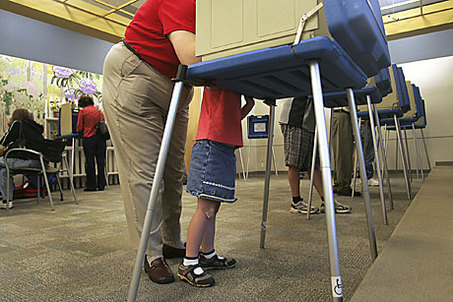Children* In an Election Season
May 12, 2016*No, this post will not be commenting on the various childishness that we’ve all seen from candidates and their supporters throughout this 2016 election cycle. We’re talking about actual, chronologically-delineated children, most of whom already have an opinion about this election, no matter how little cable news they are allowed to watch. Trust me on this.
Every election season, many of us find our lives inundated with the campaign cycle and its persistent negativity and demagoguery. As Unitarians Universalists, we often struggle with how to respond to the polarization that we see in the news, on social media, in our communities and often our own families and neighborhoods. The democratic process, religious freedom, the shared inherent dignity of all, and the search for truth and meaning, as well as many other values, shape not only our views, but how we choose to live in the world and how we treat others.
In her essay on “Children, Democracy and Unitarian Universalist Faith,” UU developmental psychologist Dr. Tracy Hurd writes,
“Whether active or passive, we’re all part of the political process and the choices we make for our participation influence our children. Recent research shows that young adults who vote are more likely to have accompanied their parents to the polls or to have talked about politics in their families when growing up, compared to young adults who don’t vote… What we do and how we talk with our children, matter. Families can nurture democracy… .
Accompanying our children through a presidential election can be a walk of faith. It’s not a linear process, but one of honoring children’s different stages of development, and inching them forward. There’s no one right way to nurture democracy, just as there is no singular way to nurture faith. But standing together we move forward.”
For Unitarian Universalists raising children and youth, this question of how to live our values in society is compounded. How do we raise children of conscience, who are politically engaged? How do we help children respond to attacks and negativity, and to educate themselves? As much as the polarization of politics and justice work challenges adults to life their faith and maintain personal equilibrium, it is also vital that we engage with children and youth around their own search for understanding.
If you are in search of age-appropriate news and information about the electoral process and the 2016 election and candidates, Scholastic News has launched the Scholastic News Election 2016 website, a site directed to children full of news, history, polls, candidate info, and more, including news written for kids, by kids.
In the last presidential election season, Michelle Richards, author of Tending the Flame: The Art of Unitarian Universalist Parenting (Skinner House, 2010), wrote this post, “Finding that middle ground: Helping children make sense of political campaigns” for the UU World Parenting blog with a number of helpful suggestions for engaging with children and youth during a political season that certainly remain relevant today.
To discover more resources for teaching children about democracy click here or explore this religious education session on the democratic process from the Tapestry of Faith curriculum, Toolbox of Faith.
- Show Some Love - May 17, 2017
- Ways to Wait - November 30, 2016
- More than Words - November 8, 2016
Renew Your Membership
We invite you to join your fellow CLFers to renew your CLF membership and stewardship of the CLF for another year.
Support the CLF
Can you give $5 or more to sustain the ministries of the Church of the Larger Fellowship?
If preferred, you can text amount to give to 84-321
Newsletter Signup
About
Quest for Meaning is a program of the Church of the Larger Fellowship (CLF).
As a Unitarian Universalist congregation with no geographical boundary, the CLF creates global spiritual community, rooted in profound love, which cultivates wonder, imagination, and the courage to act.
Contact
Church of the Larger Fellowship Unitarian Universalist (CLFUU)
24 Farnsworth Street
Boston MA 02210



